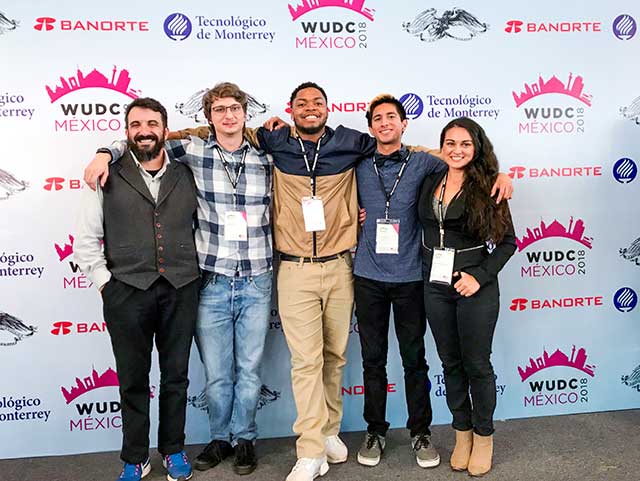
Students recently made Humboldt State history: HSU’s debate team competed on the world stage for the first time ever.
“It was nerve-wracking and exciting. I’ve competed regionally but never at this level, and didn’t know what to expect,” recalls Social Work graduate student Ruby Aguirre-Gutierrez.
Aguirre-Gutierrez, Brennen Rose, DaMon Thoms, and debate team captain Devon Escoto traveled to Mexico City over the holidays for the 38th annual World Universities Debating Championship (WUDC) at Tecnológico de Monterrey in Mexico City, where more than 1,000 students from 61 countries debated timely social, political, and economic issues.
The hard part? Teams are given only 15 minutes before each round. Teams aren’t allowed to turn to Google, coaches, or other teammates for help. No pressure.
“WUDC is highly competitive – it attracts the best of the best, like Oxford University,” says HSU debate team coach and Communication instructor Aaron Donaldson, who knows first-hand the pressure of global tournaments. Representing the University of Oregon, he and his teammate Jason Lear were WUDC semi-finalists in 2006. “HSU started off strong, it was an especially long week of competition, I’m extremely proud of our students.”
Competitive intercollegiate debate has been a tradition at Humboldt State since at least the late 1950s. And over the years, the Pacific Northwest has developed a deep debate community where the team often competes. Just last semester, an HSU team (Yolena Ramirez and Estrella Corza) took third in the Spanish-language final at Linfield College’s 2017 Mahaffey Memorial Forensics Tournament in Oregon, while Ramirez won the second place speaker award for her performance.
The style of debate has changed, too. Today, the team uses British Parliamentary (BP) debate, a slower-paced, less jargon-filled variation than its counterpart known as National Parliamentary Debate Association (NPDA) debate. Another distinction is that BP tournaments, such as the WUDC, are held at both the national and international level.
No matter the debate style, arguments are ultimately won by strategy.
Debate is an Ivy League-dominated landscape that Donaldson says is overwhelmingly white and, as a result, biased—a reality underscored by two controversial debates in 2013 and 2014 won by African American students.
“You’ll get very racist students who say hateful things. People will try to win by belittling and insulting you,” says Donaldson.
Donaldson’s answer to bias? Teaching students to approach topics through the lens of social justice.
“Debate is a form of activism to me,” he says. “My students will be prepared for the discussion of ‘All Lives Matter’ because they already know certain arguments come out of that topic.”
Having conversations about power and privilege has been especially useful for Aguirre-Gutierrez (2016). She joined the team two years ago as an undergraduate Social Work major to sharpen skills that will be useful in her professional and personal life.
“Attacking arguments from a social justice perspective is very Humboldt,” she says. “Using this strategy has strengthened my advocacy and voice.”
In the end, HSU didn’t walk away winning the world championship (that distinction went to Harvard). However, they left Mexico with something more valuable: experience.
“Debate has nothing to do with winning,” says Donaldson. “It has to do with giving a young person the opportunity to look critically at the logic behind arguments and ask themselves whether they make the world better or worse.”
Beyond building skills, the team gained broader perspectives of world events from students directly affected by issues that are often debated. One student from Sudan, for instance, shared powerful stories of police abuse and her experience living near the war-torn city of Darfur.
They also witnessed social justice in action. Outside a federal building in Mexico City, the team came across a large campsite of activists protesting the government’s response to 43 Mexican students who vanished three years ago.
“My trip to Mexico was unforgettable. Having the opportunities to observe activism in my motherland is really empowering,” says Aguirre-Gutierrez.